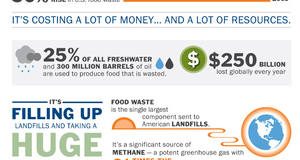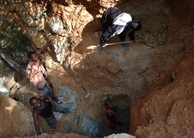|
From Interstate - Journal of International Affairs VOL. 2013/2014 NO. 1 Food Security in the Contemporary World: Making Security Sustainable
By William Barnes
Interstate - Journal of International Affairs
2014, Vol. 2013/2014 No. 1 | pg. 2/2 | «
In other locations that do not have a similar tradition, urban agriculture offers a unique opportunity to develop projects that are specific to the needs of the community in question. In the US, there has-been a trend toward community gardens, particularly in inner city areas such as the Bronx. New York . This area contains- approximately 175 community gardens. "Family health" was among the top three of the benefits felt by participants in such projects. This in and of itself is-confirm ation of the inadequacies of the commercial food structure currently in place. Furthermore, '31 % of the interviewed gardeners shared more than half [the produce that they generated]'.16 This further indicates-the far reaching effects of activities like community gardens , that make available fresh, nutritious produce, not only to the growers, but to friends, neighbours, other members of the community or other members of the gardening project itsel.
In urban environments where malnutrition is a chronic problem, development of similar practices may relieve the healthcare system of some of the costs associated with poor food quality. If the option was available to the members of community gardens to supply hospitals or nursing homes in the vicinity with their surplus produce, the financial pressure associated with food provision and security could be significantly reduced. This holds true, in particular, in welfare states where the healthcare system is funded by public monies. Some of the sustainability ventures already in place have instituted such projects. The Garden Project in Michigan, for instance, after harvesting, distributes the surplus crops to food pantries, residents of low-income housing, humanitarian organisations and 'particularly to senior citizens'.17 Distribution of surplus produce could contribute to the issues of malnutrition of those patients admitted to hospital, as well as with improving the nutrient intake of those over the age of sixty-five.
Therefore, the incorporation of sustainability into the definitional notion of food security is imperative. In addition to alleviating some of the environmental pressures modern society faces, the benefits contribute to other areas of food security and have the potential to create a mutually beneficial relationship . The choices made by those who are participating in sustainable urban agricultural projects contribute to mitigating the financial pressures of supplying individuals with food, increasing the nutritional content of individuals' intake by expanding the variety of food available for consumption and reducing the risks inherent in the oligarchic structure of commercial food production. Moreover , there are significant social benefits associated with the remaining categories: common availability and cultural acceptability. Through the multiple option s available to individuals via garden stores and, more importantly, the internet, common availability and sustainability go hand-in-hand in urban agricultural projects. This also sees the additional benefit of potential support for small-scale, local businesses. Cultural acceptability is also enhanced as sustainable agricultural projects support this aspect of food security by increasing the individual's free choice as well as relieving pressure on the producers to cater to increasingly complex cultural requirements.
The programs and initiatives that would have the most effect are relatively simple to integrate into food production systems. They would be similar to those of the Garden Project in Michigan, but would also include coordination with the local governing body to distribute to the public sphere. Other such projects that would be relatively cheap to introduce, and have nevertheless a high potential for significant impact on the carbon footprint resulting from the travel implications of large scale commercial agriculture, would be to institutionalise such initiatives such as the Research & Develop it Yourself project for hydroponic window gardens integrated into the catering departments of large businesses to contribute to the produce they would otherwise purchase. The range and flexibility of numerous pre-established and emerging innovative projects such as these, if incorporated into the consciousness and policy of the public sector could see reductions on manifold level'> and in a variety of areas. In the UK alone, malnutrition is estimated to incur a cost of 10.5 billion Euros a year.18 With the initiation of public sustainable urban agriculture programs this figure would undoubtedly decline .
One other present concern is the environmental impact and carbon footprint of states. A comprehensive drive to include sustain ability under the heading of food security would drive the public sector to push corporations to work toward the edicts of the United Nations Framework Convention on Climate Change's Kyoto Protocol,19 particularly if the initiation of such projects were to be a method of obtaining carbon credits where urban and peri-urban agricultural projects are able to minimise the carbon footprint and impact by reducing the distribution and delivery methods currently being employed by large scale agricultural producers. In addition, the outcome of such a policy initiative could have a serious impact on the health and wellbeing of those employed in industrial and commercial sectors by securing and enhancing their nutritional rights promised by a secure food supply. Moreover, the Brundtland Report stresses the need for sustainability, 'that meets the needs of the present without compromising the ability of future- generations to meet their own needs';20 this is not exclusive to the concept of food security. It should, in fact, be an essential feature of food security because, as Hopkins and Puchala say, 'securing adequate food is one of the oldest problems confronting political institutions'21 and should therefore be a duty, not just an ambition, of policy makers and urban planners.
In conclusion, the associated benefits of sustainable urban agricultural projects should mark the importance of the inclusion of sustainability as one of the tenants of the concept of food security - in addition to the recently added tenant of cultural acceptability - as it is clearly factor. In an increasingly multifarious society that gives rise to extensive challenges for policymakers, the inclusion of sustainability will go a long way towards addressing the problems associated with food production, consumption and also, and in particular, food security.
Allen, P., 'Reweaving the Food Security Safety Net: Mediating Entitlement and Entrepreneurship', Agriculture and Human Values, 16 (1991) p. 117- 129.
Althaus Ottmarrn et al. 'Community Gardens: An Exploration of Urban Agriculture in the Bronx, New York City.' Paper given at. MillionTreesNYC, Green Infrastructure and Urban Ecology: A Research Symposium, March 5-6, 2010. Available at: http:/lwww.milliontreesnyc.org:/html/ researchJindex .shtrnl (Accessed 11 November 2011).
Brundtland, G. H., Our Common Future: World Commission on Environme11t and Development (Oxford, Oxford University Press, 1987). Available at: http://www.un -document s.neUocf-02.htm (Accessed 10 November 2011).
Dobson, P. et al. 'The Patterns and Implications oflncreasing Concentrat ion in European Food Retailing', Journal of Agricultural Economics 54 (2003). pp. 111-125.
Euractiv.com EU news and policy debates across langu ages (online), 'Malnutrition costs more than obesity', 24 November 2006. Available at: http: //www.eura ctiv.com/ health/ malnutr ition-costs -obesity / article -1599 51 (Accessed 11 November 2011).
Ruel, M. T. et al., 'FCND Discussion Paper No. 51 - Urban Challenges to Food and Nutrition Security: A review of food security, health, and caregiving in cities', Int ernational Food Policy Research Institute ( online) (Washington: 1998).
Medical News Today (onlin e), 'Malnutrition: Europe's Hidden WeightProblem - Medi cal Nutrition International Industry, 31 August 2009, Available at: http: // www.medicalnewstoday .com/releases/162253.php (Accessed 13 November 2011).
Morgan, K. et al. Worlds of Food: Place Power and Proven ance in the Food Cbain (New York: Oxford University Press, 2006).
Pless-Mulloli et al. , 'The legacy of histori c land-use in allotment gardens in industrial urban settings: Walker Road allotment in Newcastle upon Tyne, UK' in Land contamination & Reclamation 12:3 (2004).
United Nations. (1998). Kyoto Protocol .New York: United Nations Framework Convention on Climate Change.
Brown, K H. and Carter, A. 'Urban Agriculture and Community Food Security in the United States: Farming from the City Center to the Urban Fringe A Primer Prepared by the Community Food Security Coalition's North American Urban Agriculture Committee'. October 2003. Community Food Security Coalition (online). Available at: http: //www.foodsecurity.org/pubs.html#ur ban ag (Accessed 11 November 2011). 22
- Dob son, P. et al 'The Pattern s and unplication s of Increasing Concentr ation in Europ ean Food Retailing', Journ al of Agr icultural Economi cs 54 ( 2003). pp. 111-125.
- Ruel, MT. etal. , 'FCND Discussion Paper No. 51 - Urban Challenges to Food and Nutrition Security: A review of food security , health, and caregiving in cities', Internation al Food Policy Research Institute (online) (Washington: 1998). p. 5.
- Brown, K. H. and Carter, A. 'Urban Agriculture and Community Food Security in the Unit ed States: Farming from the City Center to the Urban_ Fringe A Prim er Prepared by the Commurrity Food Security Coalition's North American Urban Agricultur e Committ ee'. October 2003. Communi ty Food Securit y Coalition (onlin e). Available at http ://www .food securit.y.or g/pubs.htrnl#urban ag (Accessed 11 November 2011). p. 4.
- Ruel, M. T. et al., 'FCND Discussion Paper No. 51 - Urban Challenges to Food and Nutrition Securit y: A review of food security, health, and caregivingin cities', futernational Food Policy Research In stitute (onlin e) (Wash ington : 1998) . p. 5.
- Allen, P., 'Reweaving the Food Security Safety Net: Mediati ng Entit lement and Entr eprene ur ship ', Agricu l ture and Hu man Values, 16 ( 199 1) pp. 117-129 (p. 118).
- Brown, K. H. and Carter, A. 'Urban Agriculture and Community Food Security in the United States: Farming from the City Center to the Urban Fringe A Primer Prepared by the Commun ity Food Security Coalition's North American Urban Agriculture Committee ' . October 2003. Community Food Securit y Coalition (online). Available at: http ://www.foodsecuri t_y.or g/pub s.htm l#urban ag (Accessed 11 November 2011). p. 2.
- Brown, K. H. and Carter, A. 'Urban Agriculture and Community Food Security in the United States: Farming from the City Center to the Urban Fringe A Primer Prepared by the Community Food Securi ty Coalition 's North American Urban Agriculture Committee' . October 2003. Communi ty Food Security Coalition (onlin e). Available at: http://www.foodsecurizy.o r g/pubs.html#urban ag (Accessed 11 November 2011 ). p. 2.
- Medical News Today (on line), 'Malnutrition: Europe's Hidden Weight-Probl em - Medical Nutrition Interna tional Industry ', 31 August 2009, Available at: http:l!w ww.medicalnewstodar,com/rdcases /162253.php (Accessed 13 November 2011).
- Medica l News Today (on line), 'Malnutriti on: Europe's Hidden Weight-Probl em - Medical Nutrition Internati onal Industry', 31 August 2009, Available at: http ://www.medicalnewsto day.com!releases /162253.php (Accessed 13 November 2011).
- Food Sovereignty: Taking Back Control of Our Food System. War on Want Position Paper. (August 2011). p. 4.
- Morgan, K. et al World s of Food: Place Power and Prov enance 111th e Food Cb.a.in( New York: Oxfor d Uni ver sity Pr ess, 2006) p. 3.
- Brown, K. I-£ and Carter, A. 'Urban Agriculture and Community Food Security in the United States: Farming from the City Center to the Urban. Fringe A Primer Prepared by the Commun.ity Food Securit y Coalition 's North American Urban Agriculture Committee'. October 2003. Community Food Security Coalition (online). Available at http :/fwww.foodsecurizy.org/pubs .htm l#urban ag (Accessed 11 November 20 11). p. 1.
- Philip R. Berke, Maria Man.ta Con.roy, 'Are We Plann.ing for Sustainab le Development?' Journal of the American Planning Association. 66: 1, (2000).
- Allotment History- A Brief History of Allotm ent s in the UK. Available from: http ://www.allotmcrrt.org.uk/artid es/Allotment -History.php (Accessed 12 November 2011).
- For more information see: Pless-Mulloli et al., 'The legacy of historic land-u se in allotment gardens in indu strial urban settings: Walker Road allotment in N ewcastk up on Tyne , UK' in Land co11rami11atio1&1 Reclamation 12:3 (2004) . p. 250.
- Althaus Ortmann et al. 'Community Gardens: An Exploration of Urban Agriculture in the Bronx, New York City.' Pap er given at . MillionTree sNYC, Green Infr astru cture and Urban Ecology: A Research Sympo sium , March 5-6, 2010. Available at h ttp ://www.m illiontr eesuyc or g/htm l/r esearch/index .shtml ( Accessed 11 November 201 1).
- 17 Brown, K. H. and Cart er, A. 'Urban Agriculture and Com muni ty Food Securi ty in the United States: Farming from the City Center to the Urban_ Fringe A Primer Prepared by the Community Food Security Coalition' s North American Urban Agriculture Committ ee'. October 2003. Community Food Securit y Coalition (onlin e). Available at htt p://www.foodsecur ity.org/pubs.html#urban ag: (Accessed 11 November 2011). p. l.
- Euractiv .com EU news and policy debates across languages (online) , 'Malnutrition costs more than obesity', 24 November 2006 . Available at http:/fwww .euractiv .com/health/malnutrition ::£0stsobesity/ arti cle-l 59951 (Accessed 11 Novemb er 2011).
- United Nation s. (1998) . Kyoto Protocol . New York: Unit ed Nations Fram ework Convention on Climat e Chan ge.
- Brundtland , G. H., Our Comm on Future: World Commi ssion on Environm ent and Development (Oxford, OUP , 1987). Available at http :/{www.un--documcnts .net/ocf-02.htm (Accessed 10 November 20 11).
- Raymond F. Hopkin s and Donald r. Puchala ( 1978). Perspectives on the intern ational relations of food. Internat ional Organi zation, 32 , pp. 581--616.
Allen, P., 'Reweaving the Food Security Safety Net: Mediating Entitlement and Entrepreneurship', Agriculture and Human Values, 16 (1991) p. 117- 129.
Althaus Ottmarrn et al. 'Community Gardens: An Exploration of Urban Agriculture in the Bronx, New York City.' Paper given at. MillionTreesNYC, Green Infrastructure and Urban Ecology: A Research Symposium, March 5-6, 2010. Available at: http:/lwww.milliontreesnyc.org:/html/ researchJindex .shtrnl (Accessed 11 November 2011).
Brundtland, G. H., Our Common Future: World Commission on Environme11t and Development (Oxford, Oxford University Press, 1987). Available at: http://www.un -document s.neUocf-02.htm (Accessed 10 November 2011).
Dobson, P. et al. 'The Patterns and Implications oflncreasing Concentrat ion in European Food Retailing', Journal of Agricultural Economics 54 (2003). pp. 111-125.
Euractiv.com EU news and policy debates across langu ages (online), 'Malnutrition costs more than obesity', 24 November 2006. Available at: http: //www.eura ctiv.com/ health/ malnutr ition-costs -obesity / article -1599 51 (Accessed 11 November 2011).
Ruel, M. T. et al., 'FCND Discussion Paper No. 51 - Urban Challenges to Food and Nutrition Security: A review of food security, health, and caregiving in cities', Int ernational Food Policy Research Institute ( online) (Washington: 1998).
Medical News Today (onlin e), 'Malnutrition: Europe's Hidden WeightProblem - Medi cal Nutrition International Industry, 31 August 2009, Available at: http: // www.medicalnewstoday .com/releases/162253.php (Accessed 13 November 2011).
Morgan, K. et al. Worlds of Food: Place Power and Proven ance in the Food Cbain (New York: Oxford University Press, 2006).
Pless-Mulloli et al. , 'The legacy of histori c land-use in allotment gardens in industrial urban settings: Walker Road allotment in Newcastle upon Tyne, UK' in Land contamination & Reclamation 12:3 (2004).
United Nations. (1998). Kyoto Protocol .New York: United Nations Framework Convention on Climate Change.
Brown, K H. and Carter, A. 'Urban Agriculture and Community Food Security in the United States: Farming from the City Center to the Urban Fringe A Primer Prepared by the Community Food Security Coalition's North American Urban Agriculture Committee'. October 2003. Community Food Security Coalition (online). Available at: http: //www.foodsecurity.org/pubs.html#ur ban ag (Accessed 11 November 2011). 22
Endnotes
- Dob son, P. et al 'The Pattern s and unplication s of Increasing Concentr ation in Europ ean Food Retailing', Journ al of Agr icultural Economi cs 54 ( 2003). pp. 111-125.
- Ruel, MT. etal. , 'FCND Discussion Paper No. 51 - Urban Challenges to Food and Nutrition Security: A review of food security , health, and caregiving in cities', Internation al Food Policy Research Institute (online) (Washington: 1998). p. 5.
- Brown, K. H. and Carter, A. 'Urban Agriculture and Community Food Security in the Unit ed States: Farming from the City Center to the Urban_ Fringe A Prim er Prepared by the Commurrity Food Security Coalition's North American Urban Agricultur e Committ ee'. October 2003. Communi ty Food Securit y Coalition (onlin e). Available at http ://www .food securit.y.or g/pubs.htrnl#urban ag (Accessed 11 November 2011). p. 4.
- Ruel, M. T. et al., 'FCND Discussion Paper No. 51 - Urban Challenges to Food and Nutrition Securit y: A review of food security, health, and caregivingin cities', futernational Food Policy Research In stitute (onlin e) (Wash ington : 1998) . p. 5.
- Allen, P., 'Reweaving the Food Security Safety Net: Mediati ng Entit lement and Entr eprene ur ship ', Agricu l ture and Hu man Values, 16 ( 199 1) pp. 117-129 (p. 118).
- Brown, K. H. and Carter, A. 'Urban Agriculture and Community Food Security in the United States: Farming from the City Center to the Urban Fringe A Primer Prepared by the Commun ity Food Security Coalition's North American Urban Agriculture Committee ' . October 2003. Community Food Securit y Coalition (online). Available at: http ://www.foodsecuri t_y.or g/pub s.htm l#urban ag (Accessed 11 November 2011). p. 2.
- Brown, K. H. and Carter, A. 'Urban Agriculture and Community Food Security in the United States: Farming from the City Center to the Urban Fringe A Primer Prepared by the Community Food Securi ty Coalition 's North American Urban Agriculture Committee' . October 2003. Communi ty Food Security Coalition (onlin e). Available at: http://www.foodsecurizy.o r g/pubs.html#urban ag (Accessed 11 November 2011 ). p. 2.
- Medical News Today (on line), 'Malnutrition: Europe's Hidden Weight-Probl em - Medical Nutrition Interna tional Industry ', 31 August 2009, Available at: http:l!w ww.medicalnewstodar,com/rdcases /162253.php (Accessed 13 November 2011).
- Medica l News Today (on line), 'Malnutriti on: Europe's Hidden Weight-Probl em - Medical Nutrition Internati onal Industry', 31 August 2009, Available at: http ://www.medicalnewsto day.com!releases /162253.php (Accessed 13 November 2011).
- Food Sovereignty: Taking Back Control of Our Food System. War on Want Position Paper. (August 2011). p. 4.
- Morgan, K. et al World s of Food: Place Power and Prov enance 111th e Food Cb.a.in( New York: Oxfor d Uni ver sity Pr ess, 2006) p. 3.
- Brown, K. I-£ and Carter, A. 'Urban Agriculture and Community Food Security in the United States: Farming from the City Center to the Urban. Fringe A Primer Prepared by the Commun.ity Food Securit y Coalition 's North American Urban Agriculture Committee'. October 2003. Community Food Security Coalition (online). Available at http :/fwww.foodsecurizy.org/pubs .htm l#urban ag (Accessed 11 November 20 11). p. 1.
- Philip R. Berke, Maria Man.ta Con.roy, 'Are We Plann.ing for Sustainab le Development?' Journal of the American Planning Association. 66: 1, (2000).
- Allotment History- A Brief History of Allotm ent s in the UK. Available from: http ://www.allotmcrrt.org.uk/artid es/Allotment -History.php (Accessed 12 November 2011).
- For more information see: Pless-Mulloli et al., 'The legacy of historic land-u se in allotment gardens in indu strial urban settings: Walker Road allotment in N ewcastk up on Tyne , UK' in Land co11rami11atio1&1 Reclamation 12:3 (2004) . p. 250.
- Althaus Ortmann et al. 'Community Gardens: An Exploration of Urban Agriculture in the Bronx, New York City.' Pap er given at . MillionTree sNYC, Green Infr astru cture and Urban Ecology: A Research Sympo sium , March 5-6, 2010. Available at h ttp ://www.m illiontr eesuyc or g/htm l/r esearch/index .shtml ( Accessed 11 November 201 1).
- 17 Brown, K. H. and Cart er, A. 'Urban Agriculture and Com muni ty Food Securi ty in the United States: Farming from the City Center to the Urban_ Fringe A Primer Prepared by the Community Food Security Coalition' s North American Urban Agriculture Committ ee'. October 2003. Community Food Securit y Coalition (onlin e). Available at htt p://www.foodsecur ity.org/pubs.html#urban ag: (Accessed 11 November 2011). p. l.
- Euractiv .com EU news and policy debates across languages (online) , 'Malnutrition costs more than obesity', 24 November 2006 . Available at http:/fwww .euractiv .com/health/malnutrition ::£0stsobesity/ arti cle-l 59951 (Accessed 11 Novemb er 2011).
- United Nation s. (1998) . Kyoto Protocol . New York: Unit ed Nations Fram ework Convention on Climat e Chan ge.
- Brundtland , G. H., Our Comm on Future: World Commi ssion on Environm ent and Development (Oxford, OUP , 1987). Available at http :/{www.un--documcnts .net/ocf-02.htm (Accessed 10 November 20 11).
- Raymond F. Hopkin s and Donald r. Puchala ( 1978). Perspectives on the intern ational relations of food. Internat ional Organi zation, 32 , pp. 581--616.
Save Citation » (Works with EndNote, ProCite, & Reference Manager)
APA 6th
Barnes, W. (2014). "Food Security in the Contemporary World: Making Security Sustainable." Interstate - Journal of International Affairs, 2013/2014(1). Retrieved from http://www.inquiriesjournal.com/a?id=1083
MLA
Barnes, William. "Food Security in the Contemporary World: Making Security Sustainable." Interstate - Journal of International Affairs 2013/2014.1 (2014). <http://www.inquiriesjournal.com/a?id=1083>
Chicago 16th
Barnes, William. 2014. Food Security in the Contemporary World: Making Security Sustainable. Interstate - Journal of International Affairs 2013/2014 (1), http://www.inquiriesjournal.com/a?id=1083
Harvard
BARNES, W. 2014. Food Security in the Contemporary World: Making Security Sustainable. Interstate - Journal of International Affairs [Online], 2013/2014. Available: http://www.inquiriesjournal.com/a?id=1083
Suggested Reading from Inquiries Journal
The copious amounts of forgotten and disregarded food that are tossed mindlessly into our landfills are a global travesty of massive proportions. Americans alone waste enough food in a day to transform the Rose Bowl, a football stadium capable of seating 90,000 people, into a landfill (Bloom, 2010). As an affluent nation, securely... MORE»
A genetically modified (GM) crop is defined as a recombinant-deoxyribonucleic acid plant, in which genetic material has been changed through in vitro nucleic acid techniques (Food and Agriculture Organization of the United... MORE»
When browsing the grocery aisle, consumers are bombarded with and confused by a myriad of special labels. “Organic,” “whole grain,” “all natural,” and “cage-free,” are just some of the more popular ones. Originally intended to help consumers differentiate products by communicating... MORE»
Regardless of the fact that we have long been warned of the negative impact of industrial farming, rural communities are being wiped out as local producers, like Riverbend Gardens, are put at risk in favour of urban expansion. The industrial food production industry is unsustainable, leading to increased energy consumption and food... MORE»
Latest in Environmental Studies
2021, Vol. 13 No. 09
After thousands of years of innovation, humankind has shaped the modern world into a new planetary epoch: the Anthropocene. This paper connects the human propensity to carve our comfortable, convenient civilizations into our local environments with... Read Article »
2020, Vol. 12 No. 09
Though electronic products are ubiquitous in the modern Western world, most people are not aware of the origins of the batteries that power devices such as laptop computers and mobile phones. Lithium-ion batteries, though used primarily in wealthy... Read Article »
2017, Vol. 9 No. 12
Climate change is already altering our biosphere and is projected to bring about monumental changes to our planet’s environment, changes which are unprecedented in human history. Numerous social groups have drawn upon a wide assortment of... Read Article »
2017, Vol. 9 No. 05
Is it possible to objectively define the Anthropocene? This essay argues that whether or not it is precisely definable as a geological epoch, its true value, as a concept grounded in futurity, lies within the social realm. The origins of the term... Read Article »
2013, Vol. 3 No. 1
Postmaterialist values, those that emphasize higher-order human needs, have become widely accepted as the determining force behind environmentalism in the West. Little research has been dedicated to studying the importance of these values outside... Read Article »
2017, Vol. 9 No. 03
In Gallup’s 2016 environment poll, 64 percent of U.S. adults are now worried a “great deal” or “fair amount” about global warming, with a record 65 percent attributing warming primarily to human activities (1). These... Read Article »
2016, Vol. 6 No. 1
Despite all the information we have regarding climate change and the potential perils of continuing on our path of consumption, people are slow to make the necessary changes. Our tendency to live habitually and the dampening effect continuous negative... Read Article »
|




















